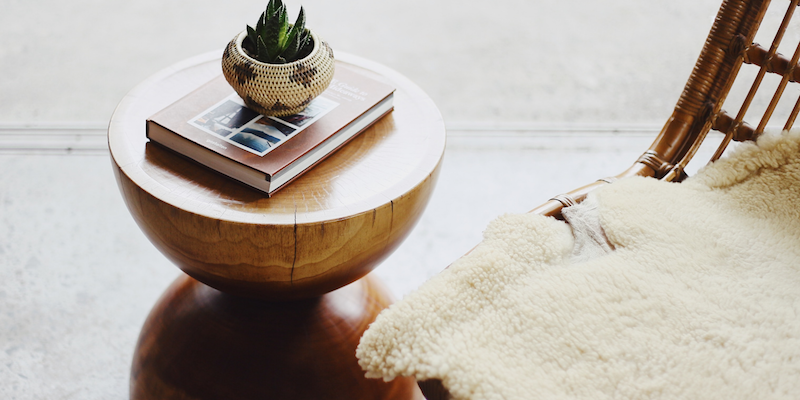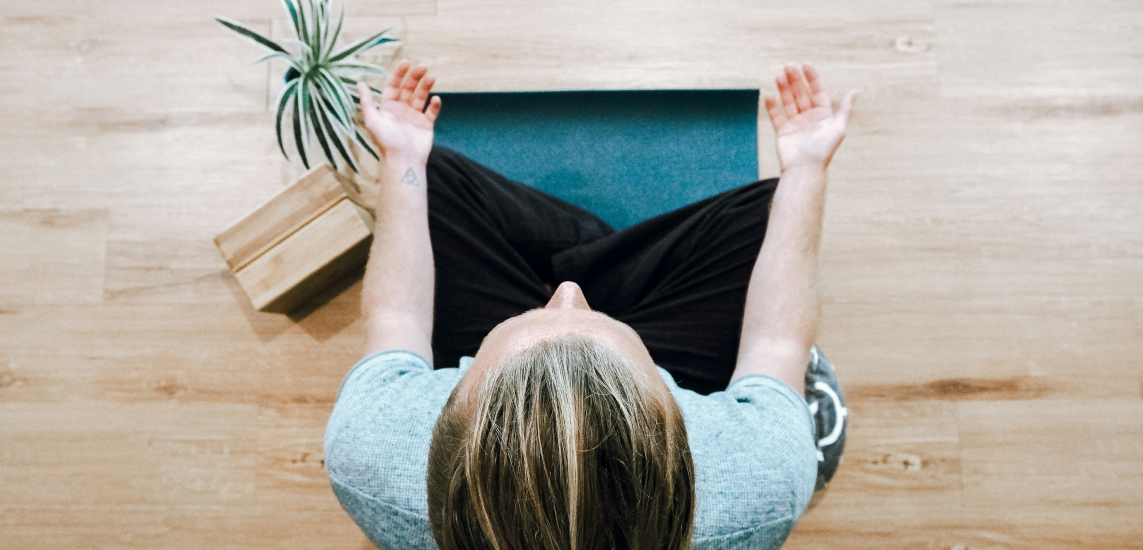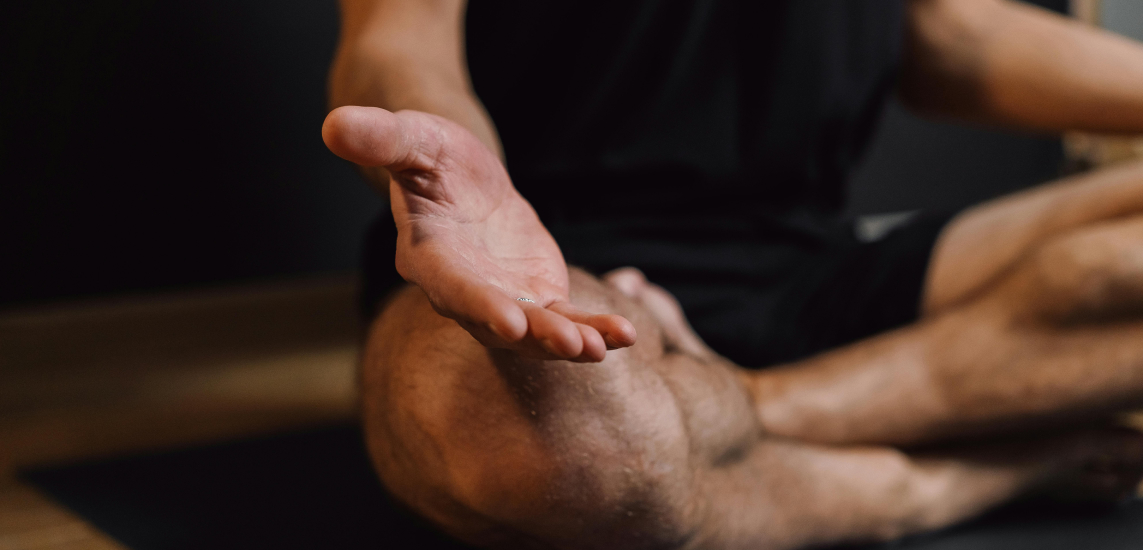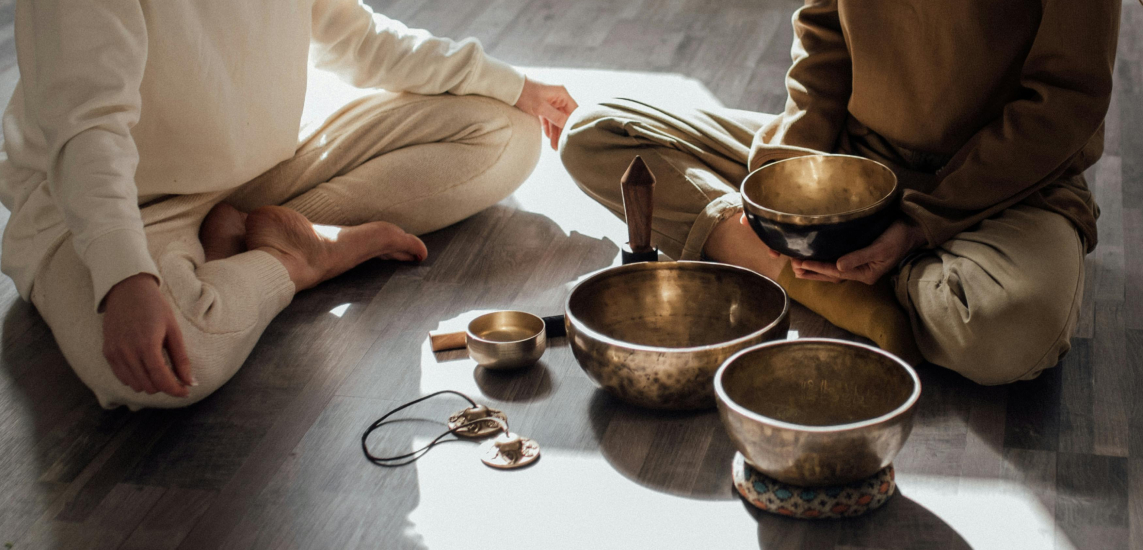After a long and stressful day, you set aside some time to sit and meditate. Your breathing deepens, and your muscles relax as you feel the tensions of the day melting away.
Suddenly, your body tightens. Waves of panic wash over you, and the feelings of relaxation vanish. You come out of the meditation more stressed than you were beforehand.
If this sounds familiar, then you might have experienced relaxation-induced anxiety (RIA). Below, we’ll explore what RIA is, how it feels, and several ways to deal with this type of anxiety.
Key takeaways
- For those with relaxation-induced anxiety, the typical signs of relaxation, such as decreased heart rate and muscle relaxation, paradoxically lead to heightened anxiety levels.
- A pattern of constant worrying and the use of worry to prevent negative emotions can make the transition to relaxation a trigger for anxiety, as it feels like losing a protective barrier against distress.
- Strategies such as the 54321 grounding method, loving-kindness meditation, and relaxation activities for short periods can help manage and reduce the impact of relaxation-induced anxiety.
- Insight Timer is a valuable resource for those looking for guided exercises to help counteract relaxation-induced anxiety. Our platform offers a wide range of free meditations and exercises, including guided versions of the 54321 grounding method and loving-kindness meditation, designed to help individuals stay present and reduce anxiety.
Unsure where to start? Insight Timer’s therapist-created anxiety worksheets and resources are designed to support nervous system regulation, self-awareness, and ease.
What is relaxation-induced anxiety?
Relaxation-induced anxiety happens when we are unable to unwind during conventionally relaxing activities (like meditating, hanging out with friends, or watching TV), ultimately leading to heightened feelings of stress and agitation. Our nervous systems become triggered by the physical and mental sensations of relaxation (like a reduction in heart rate and muscle tension), counter-intuitively spurring on more feelings of anxiety.
Subconsciously, we fear moving from relaxation to intense negative emotions, so we resist relaxation efforts.
RIA is not a mental health issue of its own, but it’s one of many ways that generalized anxiety disorder can manifest. Research suggests that around 15% of people with chronic anxiety experience symptoms of RIA.

Symptoms of relaxation-induced anxiety
Relaxation-induced anxiety typically manifests as a sharp spike in anxiety, muscle tension, or anxious thoughts and images when we try to relax. Research describes the symptoms as:
- Increased anxiety: Despite using relaxation techniques aimed at reducing anxiety, RIA causes anxious feelings to increase.
- Muscle tension: Instead of our muscles relaxing, they become more tense, contradicting our attempts at relaxation.
- Intrusive, negative thoughts: Negative thoughts may also become triggered. For example, you settle down to watch your favorite TV show, but suddenly, a thought pops into your head like, “My gas bill’s due tomorrow.” That can snowball into more anxious thoughts, and your body responds with physical symptoms of anxiety.
- Physiological symptoms: Elevated heart rate, sweating, or feelings of panic — similar to panic attacks — occur during relaxation attempts.
- Inability to “let go”: RIA can be caused by discomfort or unease with being relaxed. Some people fear relaxation may lead to a loss of control or becoming vulnerable to negative emotions. This perceived lack of control initiates a stress response.
How to decrease relaxation-induced anxiety
Although the general cause of RIA is still unknown, holistic research into mind-body interventions is growing. This brings more ideas to help us deal with RIA. Below, we’ll explore a few techniques for settling our minds and bodies and unwinding in supportive ways.
Ground yourself
Grounding is a common way to allow our minds to return to the present, helping us tune into the relaxing activity we want to engage with. A common technique is the 54321 grounding method, which encourages us to tap into our primary senses. The method is as follows:
- Name 5 things you see around you.
- Name 4 things you can touch.
- Name 3 things you can hear.
- Name 2 things you can smell.
- Name 1 thing you can taste.
By grounding ourselves with this method, we can prevent getting swept up in anxious thoughts and remain focused on the present moment. Our playlist below contains two guided audio versions of this exercise.
Explore several breathing techniques for anxiety and delve deep into why these simple exercises can be so powerful.
Exercise loving-kindness toward yourself
With loving-kindness, we can deprogram negative thoughts that we hold about ourselves — particularly the ones that get in the way of relaxing. Loving-kindness, or metta bhavana, allows us to cultivate a greater sense of forgiveness and compassion.
To develop loving-kindness, try these steps:
- Carve out a few minutes of the day when you won’t be disturbed, and sit in a peaceful setting.
- Imagine yourself basking in warmth and wellness — this could be a memory that resonates with you, or it could simply be imagining the sun’s warmth on your body.
- Repeat a mantra, a positive recurring phrase, to yourself. This could be anything, but a common one is, “May I be well, may I be happy.”
- Let this feeling envelop you, and if your mind wanders, just slowly steer it back toward that sensation of warmth and wellness.
At first, this may be difficult. We’ll talk about why it’s necessary to go as slow as possible with this technique below. But if you form a daily practice, you’re on the path to cultivating more self-compassion that can help you battle RIA.
We’ve handpicked some guided exercises that can help counteract relaxation-induced anxiety. Discover two guided 54321 exercises, a loving-kindness meditation for anxiety, as well as other SOS practices:
- Grounding Exercise For Panic & Anxiety (54321 Exercise) Elizabeth Tyrpak 3:50
- Grounding Into The Present (54321 Exercise) Kaylee Misener 5:59
- Metta Meditation for Anxiety & Resentment Rachelle Tersigni 21:13
- SOS for Anxiety and Overwhelm: 4-7-8 Breathing Technique Melissa Bennett 8:00
- SOS Anxiety Release Dr. Irene Cop 4:22
- Three Part Breath Katia Tallarico 10:00
Go slow and relax for short periods of time
Consider engaging in relaxing activities in smaller chunks to counteract any feelings of helplessness. Rather than relaxing for long periods of time, try 5-10 minutes. This way, we experience initial relaxing feelings, and if anxiety kicks in, we simply stop and relax again later.
By gently exposing yourself to a relaxing activity like meditation, you slowly become used to the physical and psychological sensations of relaxation, allowing you to feel more and more comfortable in those activities.
Explore various one-minute meditations that you can easily apply to your day and help to build your relaxation practice.
What causes relaxation-induced anxiety?
Relaxation-induced anxiety may be caused by a habit of constant worrying. This likely stems from the belief that staying worried offers a protective barrier against unexpected emotional spikes.
So when we attempt a relaxation session, studies suggest, this resistance can increase our anxiety and exacerbate the very feelings we’re trying to avoid.
Additionally, research confirms that people with asthma and generalized anxiety disorder are more prone to feeling anxious when they’re supposed to be relaxing. Specifically, if you’ve dealt with asthma, you are two times more likely to experience relaxation-induced anxiety.
For those with generalized anxiety disorder, the likelihood is even higher, making you about four times more susceptible to feeling anxious during relaxing activities.
RIA affects more people than you think
If you’re experiencing the signs and symptoms of RIA, you are certainly not alone. Dr. Christina Luberto and her colleagues revisited the phenomenon, as research into RIA has been sparse since the 1980s when the term originally appeared in literature.
Luberto concluded that 15% might be a very conservative estimate — their research estimates that RIA affects between 17-53% of the chronically anxious population. On top of this, they’ve found that RIA is prevalent even if you don’t suffer from clinical anxiety.
The Relaxation Sensitivity Index
Shocked by the number of people who are potentially affected by RIA, Luberto sought to properly classify and identify the source of the problem. In 2012, Luberto developed the Relaxation Sensitivity Index, a questionnaire designed to probe exactly what part of an activity can trigger anxious thoughts and feelings. The index is made up of statements like:
- “I don’t like to relax because it makes me feel out of control.”
- “It scares me when my body feels relaxed.”
- “I avoid slowing down and relaxing, so I don’t have to think about certain things.”
Based on this index, RIA is characterized by resisting thoughts and feelings associated with relaxation. These thoughts and feelings — like your mind wandering and your heart rate slowing down — are then met with classic symptoms of anxiety.
If you’re experiencing symptoms of anxiety related to relaxation, consider the steps suggested above and consult with a qualified medical professional.
Another anxiety-related phenomenon affecting many people’s lives is morning anxiety. Psychotherapist Andrea Wachter outlines two scenarios in this article of dealing with anxiety in the morning.
Listen to yourself
Reducing RIA is a slow process, so it’s important to have grace and kindness with your journey. Practicing mindfulness can also be helpful.
Adopting a daily mindfulness practice is another step closer to successfully managing RIA. By cultivating an acute awareness of your thoughts, feelings, and sensations, you are developing the ability to stop relaxation-induced anxiety in its tracks and start savoring the things that make life so enjoyable.
Discover our large free collection of meditations for anxiety that can help you focus on staying in the present moment.
FAQs
Why does my anxiety get worse when I relax?
Anxiety may worsen upon relaxing because of relaxation-induced anxiety (RIA), where the physical and mental sensations of relaxation unexpectedly trigger anxious feelings. This paradoxical response can be due to fear of the unknown, a shift from being constantly busy to having free time, or the brain’s reaction to perceived vulnerability during relaxation.
What is the 3-3-3 rule for anxiety?
The 3-3-3 rule is similar to the 54321 grounding method. This grounding rule typically involves identifying three things you can see, three sounds you can hear, and moving three body parts. It helps you refocus and ground your mind in the present moment, diverting it from anxious thoughts.
Why can’t I relax and enjoy life?
Difficulty relaxing and enjoying life can stem from relaxation-induced anxiety, where attempts to relax unintentionally lead to increased anxiety. This can be due to underlying worries, a habit of constant vigilance, or fear of losing control.
Is there any solution for relaxation-induced anxiety?
Solutions for relaxation-induced anxiety include mindfulness-based practices, cognitive behavioral therapy (CBT), grounding techniques, and gradual exposure to relaxing activities, all aimed at reducing the anxiety response to relaxation.
References
Braith, J. A., McCullough, J. P., & Bush, J. P. (1988). Relaxation-induced anxiety in a subclinical sample of chronically anxious subjects. Journal of behavior therapy and experimental psychiatry, 19(3), 193–198. https://doi.org/10.1016/0005-7916(88)90040-7
Heide, F. J., & Borkovec, T. D. (1983). Relaxation-induced anxiety: Paradoxical anxiety enhancement due to relaxation training. Journal of Consulting and Clinical Psychology, 51(2), 171–182. https://doi.org/10.1037/0022-006X.51.2.171
Jacobsen, J. (2024, January 3). The 333 rule for anxiety. MentalHealth.com. https://www.mentalhealth.com/disorder/anxiety-disorders/the-333-rule-for-anxiety
Kim, H., & Newman, M. G. (2019). The paradox of relaxation training: Relaxation induced anxiety and mediation effects of negative contrast sensitivity in generalized anxiety disorder and major depressive disorder. Journal of affective disorders, 259, 271–278. https://doi.org/10.1016/j.jad.2019.08.045
Luberto, C., Cotton, S., & McLeish, A. (2012). OA14.01. Relaxation-induced anxiety: predictors and subjective explanations among young adults. BMC Complementary and Alternative Medicine, 12(Suppl 1), O53. https://doi.org/10.1186/1472-6882-12-S1-O53
Luberto, C. M., McLeish, A. C., & Kallen, R. W. (2021). Development and Initial Validation of the Relaxation Sensitivity Index. International journal of cognitive therapy, 14(2), 320–340. https://doi.org/10.1007/s41811-020-00086-3
Disclaimer: This article is for informational purposes only and should not be considered medical advice. If you have concerns about anxiety or any other conditions mentioned here, please seek help from a medical professional.



-1.jpg)




